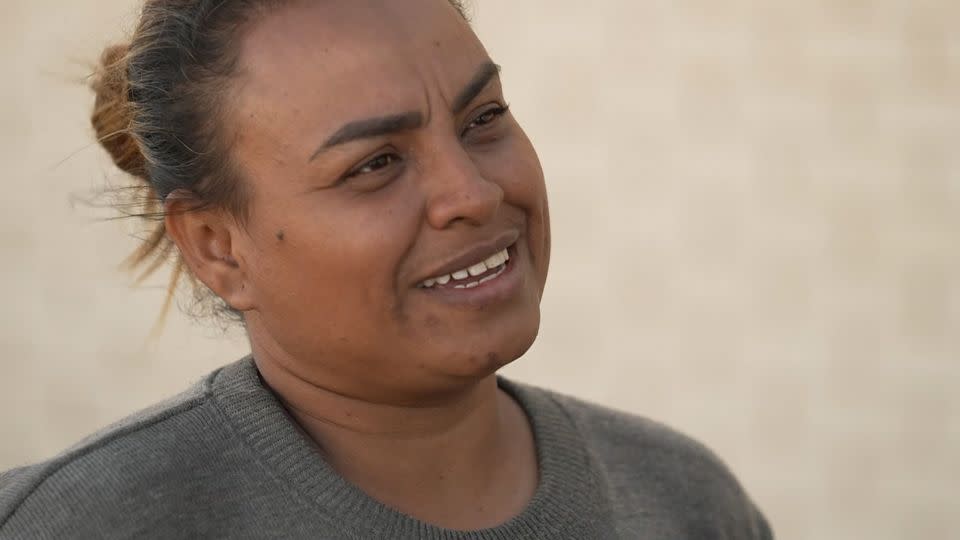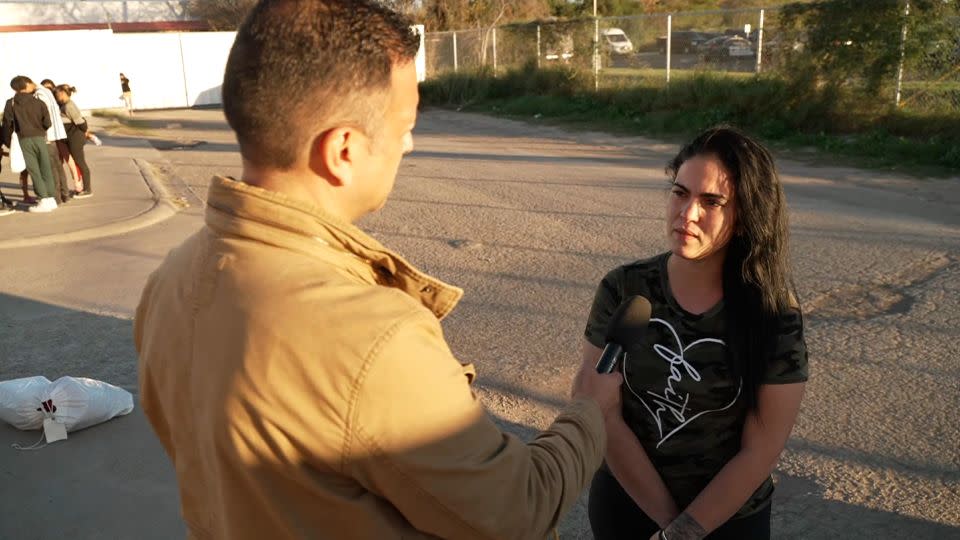For many migrant families at the southern US border, going back is not an option
A mother who fled her native country with two children after one was kidnapped; a woman who was forced to strip down by thieves looking for money; an activist made unemployable by speaking out against her country’s government: These are some of the stories CNN heard outside a shelter for migrants in Eagle Pass, Texas.
On Christmas Eve, dozens of migrants had just arrived at the shelter after being released by immigration authorities on parole. Some of them were waiting outside, as the shelter had no room for the new arrivals.
Silvia del Carmen Flores, 38, sat on the sidewalk with her 3-year-old son, Nikson, on her lap and her 16-year-old daughter, Yolani, nearby. Flores told CNN they had just been released on parole after requesting asylum and were hoping to catch a ride to San Antonio, where they had been told they may be able to stay at a bigger shelter.
Their journey from their native Honduras started on December 12, Flores said. After traveling in buses and taxis through Guatemala and Mexico, they reached the Mexican city of Monterrey. With the last money they had, Flores said, they caught a flight to Piedras Negras, across the border from Eagle Pass. There, they crossed the border at the Rio Grande, at a point where the water was waist-high.
Flores said she had been thinking about leaving Honduras for a while due to the family’s financial situation. Then, two months ago, Yolani was kidnapped and Flores had to pay money to get her back. After that, Flores felt she had no other option than to leave, she said.
Yolani, a ninth grader, is uncertain about her family’s future, but said, “I don’t want to go back to Honduras. There’s too much corruption, crime, and things like that.”
The Flores family is among the tens of thousands of immigrants who have arrived at Eagle Pass in the past few weeks. This new surge in border crossings has stretched a number of already overwhelmed US agencies.
Federal authorities reported a seven-day average of more than 9,600 migrant encounters along the US southern border in December, a Homeland Security official said earlier this month. That number is among the highest amounts ever recorded. The seven-day average reported on November 28 was around 6,800 encounters.
A senior US Customs and Border Protection official told CNN Monday that many steps have been taken – including ramping up resources – to address the recent challenge the agency faced in Eagle Pass.
But CBP isn’t out of the woods yet, the official said. Despite the improved scene in Eagle Pass, illegal crossings continue and are being fueled by bad actors who push migrants to enter the US southern border between ports of entry, the official said.
Marcelly Giraldo, 33, a domestic worker from Medellín, Colombia, told CNN a lack of opportunity in her own country prompted her to seek a better life in the US. Her main motivation, she said, is a daughter she had to leave behind with a sister – a child she hopes to bring to the US once her asylum request has been approved.
Giraldo said she walked four days in the Panamanian jungle known as the Darien Gap, where she saw dead bodies. In Guatemala, she said she was forced to strip down by thieves.
“They forced me to get naked inside the bus. They were asking for money. Sometimes they believe people hide money under their clothes,” Giraldo said.
Many of the migrants who spoke to CNN seemed to have the belief there was some sort of legal provision in US immigration law that made it temporarily easier to get legal status.

“When I heard they were giving (immigrants) the benefit of being allowed into the country, I decided to make the trip. Otherwise, I would have never done it. I would have never taken the risk,” Giraldo said.
Immigrants must show proof of their reasons for requesting asylum – especially through legitimate documents – before an immigration judge. A failure to do so will likely be followed by deportation.
In statement issued last week, Troy Miller, US Customs and Border Protection’s senior official performing the duties of the commissioner, said many migrants “are often misled and victimized by the transnational criminal organizations. These smugglers are recklessly putting migrants into harm’s way: in remote locations across the border, onto the tops of trains, or into the water of the Rio Grande.”
Milaidis Duarte Felipe, a 30-year-old nurse from Cuba, said she left her native country with her sister and young niece on October 27. She had to leave behind her 7-year-old son, Duarte Felipe told CNN, as she fled political persecution for speaking out against the government.

From Cuba, Duarte Felipe said they took a flight to the Dominican Republic and then to Managua, Nicaragua. They traveled from the Nicaraguan capital to the Honduras border by taxi and then by bus through Guatemala before crossing the Suchiate River – which marks the border between Mexico and Guatemala – on a raft.
“On our way to the United States, we were kidnapped. The kidnappers were asking for money and our family paid the amount they were asking for. After arriving to Mexico City, we were on a bus when we were robbed. They took our phones, but couldn’t take our papers because we hid them really well,” Duarte Felipe said.
For now, she said being in the US has been a great Christmas gift, especially since she arrived in the country on Christmas Eve and was picked up in Eagle Pass by relatives who live in Houston.
“I’m going to spend (Christmas) with my family. I’m going to live in a free country. Where at least… I don’t know. I will live in a free country where citizens’ rights are respected, unlike where I used to live,” Duarte Felipe said.
She said she plans to bring her son to the US as soon as she’s granted asylum.
“He’s my only child,” she said with tears in her eyes.
CNN’s Maxime Tamsett and Raja Razek contributed to this report.
For more CNN news and newsletters create an account at CNN.com

